_____
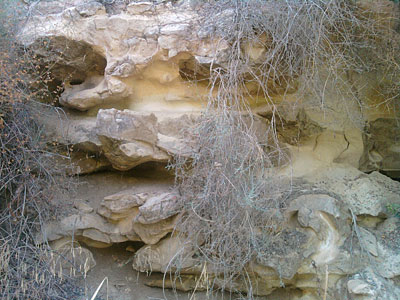
Editor’s note:
As we are challenged in the world by the scientific and technological changes we produce, a line of thinking has been emerging that the English language is not up to the task of allowing us to communicate well enough to address important issues as they arise. And because of the nature of our English language, we are hindered in comprehending our situations, or taking more than a few constructive steps into them collectively. For instance, Frank Wilson at his blog Books, Inq: The Epilogue recently made a post titled Language and reality. He quoted an article in New Scientist by F. David Peat called Is there a language problem with quantum physics? Here is that quote:
Bohm pointed out that quantum effects are much more process-based, so to describe them accurately requires a process-based language rich in verbs, and in which nouns play only a secondary role. In the last year of his life, Bohm and some like-minded physicists, including myself, met a number of native American elders of the Blackfoot, Micmac and Ojibwa tribes—all speakers of the Algonquian family of languages. These languages have a wide variety of verb forms, while they lack the notion of dividing the world into categories of objects, such as “fish”, “trees” or “birds”.
After quoting David Peat, Frank Wilson then writes, “Alan Watts made a similar point many years ago (he also referred to American Indian languages, I believe)—suggesting that we are not so much ‘people’ as ‘peopling’.” Here is an animation called “the Earth is People-ing” taken from the lecture by Alan Watts called Who Am I:
All this said to introduce Luisetta Mudie’s essay called Climate Change and the Poetic Imagination. In it, she challenges our poetic imaginations—in a sense, the poetry we are making. I ditto that challenge here. If you are a poet, please read Luisetta’s article and post a poem as a comment/reply. Your poem need not be a masterpiece—although I hope it is—but a poet’s sincere effort at a new way, or an alternative way, of conversing on the ongoing climate.
Sincerely,
C.
_____

by Luisetta Mudie
Climate Change and the Poetic Imagination
While the world’s leaders converged on Copenhagen for the COP15 climate change negotiations this past December, the rest of the world watched the by now familiar roles play out on television. The Charismatic President, the Representative of a Small Island, the Scoffing Skeptic, the Satirical Comedian; the Environmental Protester; the Cop, the Arguing States, the Brussels Bureaucrat, the Television Journalist, the Leaked E-Mail.
If this were a medieval morality play, or an ecopsychology conference, a few Virtues and Vices would be in there, too, personified: Greed; Temperance, as well as Mother Earth; the Oceans, the Fish, the Disappearing Species, the Demon Carbon, placing his Footprints across the earth, faced by the Angel Temperance, who keeps things in Balance, so that All May Live.
But where are We? We the Consumer, the Viewer, the Individual Polluter, we the Six Billion? What do we, as adults, Imagine about climate change? What are the characters in our dramas? Are they apocalyptic, like the Book of Revelation and the movie 2012, or stories of genocide and endless weeping, the World Ending With a Whimper? Are they Blackly comical, full of selfknowing Dr. Who irony and compassion, like a Douglas Adams script? Or tragic, like the curse of Oedipus that fell on Thebes as a direct result of an attempt to evade Fate?
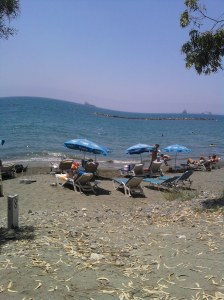 How do we imagine the story forward? Our role in it? Is the council Recycling Man a facilitator of salvation? Do we lash ourselves in the knowledge that the Original Sin of our age appears to be that we pollute, irrevocably, the planet that gave us life? Or are we on a heroic mission to Save the Planet, or willing to die in the attempt, knowing that, if it all goes down the toilet, at least we Did Our Best, but Others Would Not Listen?
How do we imagine the story forward? Our role in it? Is the council Recycling Man a facilitator of salvation? Do we lash ourselves in the knowledge that the Original Sin of our age appears to be that we pollute, irrevocably, the planet that gave us life? Or are we on a heroic mission to Save the Planet, or willing to die in the attempt, knowing that, if it all goes down the toilet, at least we Did Our Best, but Others Would Not Listen?
Can we imagine anything else? Will some Ubergeek or White-Coated Scientist invent something that brings in global changes? Or will lots of inventive people come up with New Ways of Doing Things, or Not Doing Things?
Are we those Inventive People? Or have we lost touch with our imaginations to the extent that the very phrase Imagining Climate Change only brings images of pictures of a panting, smoke-encircled Earth crayoned by children? If so, is that because our imaginations are so very badly crayoned, because they have never been educated beyond primary school, because Imagining as a way of knowing has long been disregarded by scientific rationalism, the only Respectable Way of Knowing anything in our current society?
Poesis, the art of Imagining, is also another word for Making. The essence of poetry lies in the ability to Make New Relationships between things which weren’t automatically related in people’s imaginations: to come up with Image not pre-masticated by the media, by Canonical Literature (which, for many of us in the West, includes the texts of Science), or by the commonness of everyday speech. The current climate change crisis is a direct result of our emphasis on New Ways of Doing Things. Not Doing Things is simply its antithesis, and the best we can apparently come up with, because we are stuck without the full use of our Imaginations and the Different Ways of Knowing and Being that they might bring.
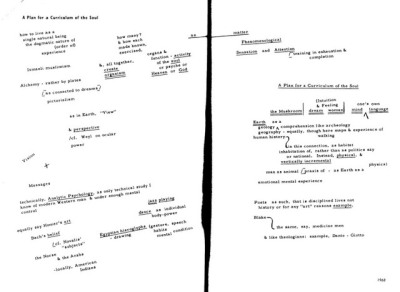
Humankind has used Imagining as a Way of Knowing before. So-called primitive societies used animism, shamanism, song and story. But those ways have been skewered for the past century or so in intellectual debate about whether the Savage was really as Noble as some people seemed to think, with both sides caricaturing the other side’s view.
The point isn’t really about the Savage, however, who may or may not have enjoyed peace or health as Imagined. It’s about The Way Nothing Got in the Way of his Imagining about the very difficult environments she was forced to negotiate. Ways were found, like the Songlines of the Aborigines that guided them very practically, apparently for tens of thousands of years, through an Imaginal Landscape, not to Overcome Problems, but to Live in a Tough Place. We have become softened into thinking that we shouldn’t have to live in a tough place, with the Demons and Angels that come with Poverty, Pestilence, Famine, and so on. And yet, here we are, Between a Rock and a Hard Place.
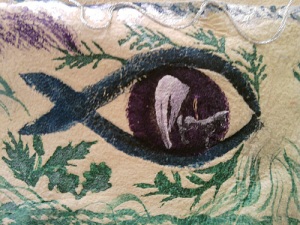 This is the True Ground of poetry, of Imagination, and the birthplace of New Ways of Being. Science cannot get very far with climate change divorced from its partner, the Mature (not classroom) Imagination. And the more of us who make the transition from Consumer/Viewer to Active Imaginer the better. At the back of the role of Consumer/Viewer, sits the notion (personified, of course!) of the Individual, who Inhabits a Private Reality we call Human Subjectivity. We are now painfully aware that the Realities we inhabit are not only private. Whether we imagine ourselves as Rising Apes or Fallen Angels, those Images are shared, and the Realities they lead to are also shared.
This is the True Ground of poetry, of Imagination, and the birthplace of New Ways of Being. Science cannot get very far with climate change divorced from its partner, the Mature (not classroom) Imagination. And the more of us who make the transition from Consumer/Viewer to Active Imaginer the better. At the back of the role of Consumer/Viewer, sits the notion (personified, of course!) of the Individual, who Inhabits a Private Reality we call Human Subjectivity. We are now painfully aware that the Realities we inhabit are not only private. Whether we imagine ourselves as Rising Apes or Fallen Angels, those Images are shared, and the Realities they lead to are also shared.
In the Imagination, notions are Persons, ideas are Roles, and all can be modified and re-cooked (as the Temperature Rises) by the Images that emerge between the Rock and the Gum Tree. Climate change forces us into emergent forms of behaviour and the Great Dissonance heard in Copenhagen is none other than the Cognitive Dissonance between our environment and our ability to live in it. As the latest teaching theories suggest, Cognitive Dissonance is the beginning of New Ways of Knowing. These have always emerged from the gap between our situation, and our under-standing of it. While they have been guided and formed by all the resources an educated adult mind can muster, they still have only one source: the Image that comes out of the dark.
_____
 Luisetta Mudie is a freelance writer specialising in depth psychology, shamanism and the imagination.
Luisetta Mudie is a freelance writer specialising in depth psychology, shamanism and the imagination.
_____
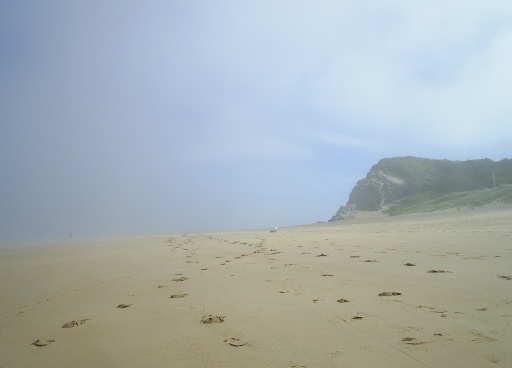
_____
4 responses to “Luisetta Mudie’s Climate Change and the Poetic Imagination”
[…] ambivalence is evident in a piece by Luisetta Mudie called “Climate Change and the Poetic Imagination.” In it, if I understand her correctly, Mudie seems to accept the science of AGW and suggests that we […]
Interesting. I think your notion concerning imagination and the environment is larger than at first glance it might seem. Let me explain.
I live in Louisiana. I grew up in Florida. The Gulf of Mexico is in my blood, in my genes, in my soma. I also worked on off-shore oil rigs back in the seventies. I’ve been obsessed with the Deepwater Horizon disaster since it happened on the 20th of April. Nightly I check the NOAA site for their trajectory maps of where the spill is going. Nightly I find other sites spill related. Audobon’s, the Sierra Club’s, Dept of Interior’s, BP’s. Having worked off-shore I remember protocol for bringing an exploratory well into production: the cement poured, the mud used to counteract oil and gas pressure, the BOP (Blow Out Preventor), a device that weighs something like 300 tons.
Back in the 70s deep water drilling was measured in hundreds of feet. The Deepwater Horizon was drilling in 5,000 feet of water, a depth at which both temp and pressure are at a new extreme. When I worked off-shore divers could go down to the wellhead and fix problems. Now it needs an ROV. Immediately following the explosion I realized that, on the strength of a 34 year old experience, I was still able to follow protocol in the event of a failure. I was shocked. Incredulous. 34 years later and at a far greater depth drilling companies rely on the same technology for blow out prevention. I view the failure as a lack of imagination on the part of engineers and scientists.
As I say I’ve been following the spill’s progress obsessivly, daily. I saw the spill entering the Gulf Loop current before it did. I saw the deep underwater plumes of oil before they were reported. I saw how, once it enters the Gulf Loop, it is headed up the Atlantic Coast as far as Nova Scotia and then turning for northern Europe. And I saw how these underwater plumes will appear on the shore unnannounced, as is now happening on the LA coast.
My point is your point. Imagination is what is required to wrap the brain around ecological disaster. Engineers don’t have much imagination. They tend to operate on a wing and a prayer and their favorite word is “hopefully.” Same is true of scientists too. Without imagination ain’t nobody going to redress ecological imbalance. Now we got a disaster generational in scope.
I keep a daily vigil on my poetry board. Anyone can email me if they want to follow the daily updates.
Tere
That image of the beach is very surreal. thanks for posting.
I agree – such a wonderful picture of the beach. I know that’s not really commenting on the post, but I just love the picture.